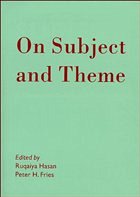Main description:
The ten papers in this volume focus on Subject and Theme. Theme began its life as a semantic notion in the work of Vilém Mathesius, while Subject has traditionally been seen as just a syntactic entity. More recently two related perspectives on these concepts have attracted linguists' attention: the formal criteria for their recognition and the relations between the two concepts. Using the systemic functional model as their point of departure, the papers in the present volume consider the two notions in a wider context by relating them to the interpersonal and textual metafunctions of language. By contrast with the current linguistic approaches, the primary focus here is neither simply on formal recognition criteria nor on the relation of these elements to each other; instead, the notions of Subject and Theme are examined from the point of view of their function in the economy of discourse, with studies of their significance in English and French, as well as in a range of non-Indo-European languages. Definitions of the concepts are offered on the basis of their discourse functions, which are also important in selecting the formal recognition criteria and in understanding their mutually supportive role vis à vis each other.
Most of the papers in the volume are a selection from presentations made at the 19th International Systemic Functional Congress at Macquarie University.
Table of contents:
- Reflections on subject and theme: An introduction
- 1. Approaching the French clause as a movie in dialogue
- 2. Mood and the Ecosocial dynamics of semiotic exchange
- 3. The English 6;tag question'
- 4. 'Nothing' makes sense in Weri
- 5. Subjectlessness and Honorifics in Japanese
- 6. A dynamic perspective
- 7. On theme in Chinese
- 8. A systematic functional approach to the thematic structure of the old English clause
- 9. Themes, methods of development, and texts
- 10. Defining and relating text segments
- Index
The ten papers in this volume focus on Subject and Theme. Theme began its life as a semantic notion in the work of Vilém Mathesius, while Subject has traditionally been seen as just a syntactic entity. More recently two related perspectives on these concepts have attracted linguists' attention: the formal criteria for their recognition and the relations between the two concepts. Using the systemic functional model as their point of departure, the papers in the present volume consider the two notions in a wider context by relating them to the interpersonal and textual metafunctions of language. By contrast with the current linguistic approaches, the primary focus here is neither simply on formal recognition criteria nor on the relation of these elements to each other; instead, the notions of Subject and Theme are examined from the point of view of their function in the economy of discourse, with studies of their significance in English and French, as well as in a range of non-Indo-European languages. Definitions of the concepts are offered on the basis of their discourse functions, which are also important in selecting the formal recognition criteria and in understanding their mutually supportive role vis à vis each other.
Most of the papers in the volume are a selection from presentations made at the 19th International Systemic Functional Congress at Macquarie University.
Table of contents:
- Reflections on subject and theme: An introduction
- 1. Approaching the French clause as a movie in dialogue
- 2. Mood and the Ecosocial dynamics of semiotic exchange
- 3. The English 6;tag question'
- 4. 'Nothing' makes sense in Weri
- 5. Subjectlessness and Honorifics in Japanese
- 6. A dynamic perspective
- 7. On theme in Chinese
- 8. A systematic functional approach to the thematic structure of the old English clause
- 9. Themes, methods of development, and texts
- 10. Defining and relating text segments
- Index
